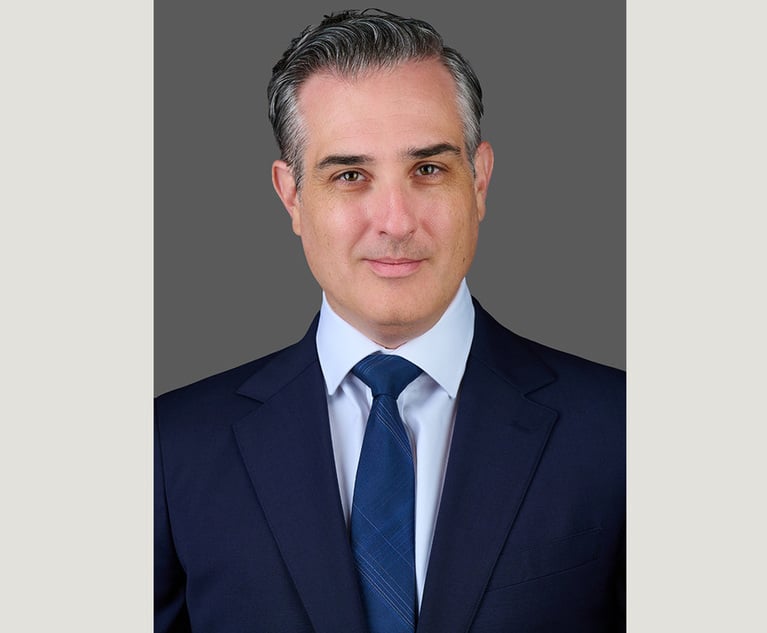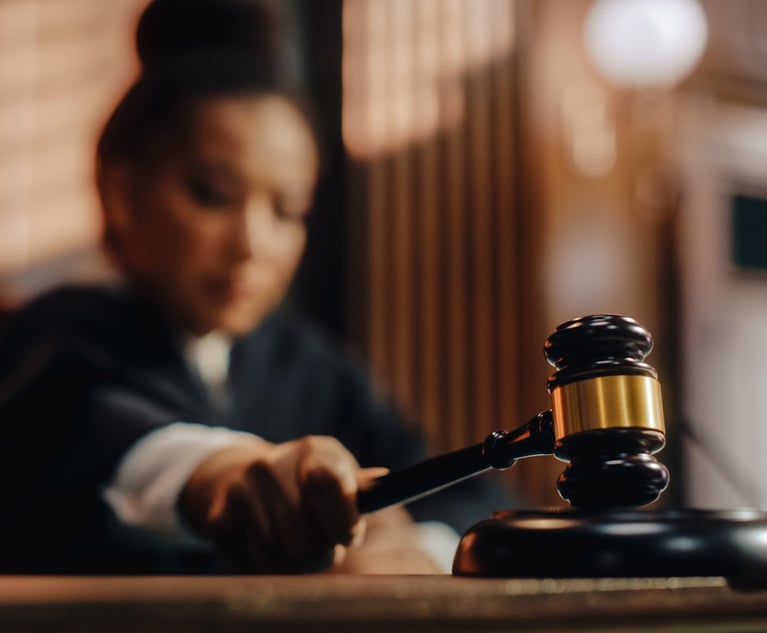Fight Over Hidden Property, Infidelity Could Reshape Pa. Trusts and Estates Law
The Pennsylvania Supreme Court is now poised to answer two questions: Does the failure of one settlor of a trust to disclose to another each and every asset of a corporate entity being contributed to the trust constitute fraud? And should irrevocable trusts be subject to a stricter standard than wills for finding that fraud occurred?
September 19, 2019 at 12:39 PM
5 minute read

Does the failure of one settlor of a trust to disclose to another each and every asset of a corporate entity being contributed to the trust constitute fraud? And should irrevocable trusts be subject to a stricter standard than wills for finding that fraud occurred?
The Pennsylvania Supreme Court is poised to answer those questions in a case in which a woman is seeking to invalidate an irrevocable trust after discovering that its assets included two Florida properties her then-husband had purchased without her knowledge—and that his girlfriend was living in one of them.
In In re Passarelli Family Trust, the Superior Court en banc unanimously reversed a Chester County Orphans' Court ruling that had granted Margaret Passarelli's petition to terminate the trust based on a finding of fraudulent misrepresentation by her now ex-husband Joseph Passarelli, who is also the trustee. The trust named Margaret and Joseph Passarelli as beneficiaries, along with their two minor children.
While the Orphans' Court found that Margaret Passarelli would not have agreed to execute the trust if she had known about Joseph Passarelli's extramarital affair and the two properties he purchased without her consent, the Superior Court said there was no proof that a misrepresentation was made.
Joseph Passarelli had purchased the two Florida properties through two companies known as Japen Holdings and Japen Properties (referred to collectively in the complaint as Japen), according to the Superior Court's March 28 opinion, penned by Judge Anne E. Lazarus. Because Japen and its aggregate valuation were included in the trust's schedule of assets, that constituted a sufficient disclosure, Lazarus said.
"Here, Japen and its total value were identified in Schedule 'A' to the trust," Lazarus said. "The description provided was sufficient to describe and identify the particular asset contributed to the trust. Indeed, it would be patently absurd to require that each and every asset of a corporate entity be identified upon the entity's contribution to a trust in order to constitute a valid transfer. A corporation is, itself, an identifiable asset and can be sufficiently described by its corporate name."
Lazarus was joined by President Judge Jack Panella and Judges Susan Peikes Gantman, John Bender, Jacqueline Shogan, Victor Stabile, Alice Beck Dubow, Carolyn Nichols and Maria McLaughlin.
The Supreme Court granted allocatur in the case Sept. 11.
Margaret Passarelli had relied on the Superior Court's 1996 ruling in In re Estate of Glover, in which the court, pointing to the state Supreme Court's 1962 ruling in In re Paul's Estate, held that only two elements needed to be proven to demonstrate fraud: that the testator had no knowledge of the concealed or misstated fact, and that the testator would not have made the same bequest had she known the truth.
But Lazarus said Glover incorrectly omitted a key element of Paul's definition of fraud: the requirement that there be "fraud and misrepresentation" in the concealment or misstatement of fact.
"Indeed, the Glover framework entirely omits the concepts of knowledge/recklessness, justifiable reliance and injury, all of which are key elements any fraud inquiry," Lazarus said.
Lazarus added that the Passarellis' case was also distinguishable from both Glover and Paul because those cases discussed the fraudulent inducement of wills, not irrevocable trusts.
"Unlike a will, which is ambulatory and does not 'speak' until the death of the testator, an irrevocable trust is just that—irrevocable—from the moment of its execution," Lazarus said, adding, "Assuming, arguendo, that Paul and/or Glover provide the proper framework for a fraud analysis in the context of wills, we conclude that, where an irrevocable trust is at issue, a stricter standard should apply. Thus, we hold that it is appropriate to apply, in the instant matter, the test for fraud as expressed in the case law concerning common-law fraud, as well as in the Restatement of Trusts and the Restatement of Property, which incorporate elements of knowing or reckless misrepresentation; intention to mislead another into reliance; and resulting injury caused by reliance."
Counsel for Margaret Passarelli, John McKenna at MacElree Harvey in West Chester, said he and his client are "excited" that the justices agreed to take up the case.
McKenna said he believes the justices need to reexamine Paul and its progeny to clarify what it takes to terminate an irrevocable trust based on fraud. He said he's currently researching how other jurisdictions handle the issue.
But counsel for Joseph Passarelli, Mark Ashton of Fox Rothschild in Exton, said he was surprised the Supreme Court took up the case, given that there is now a unanimous, published Superior Court en banc opinion on the matter.
Ashton added that while the question of what constitutes fraud is an important one, Glover is not analogous to Passarelli because Glover involved theft of money from the testatrix of a will and Passarelli simply involved the formation of a trust intended to benefit his client, his client's wife and their two children.
This content has been archived. It is available through our partners, LexisNexis® and Bloomberg Law.
To view this content, please continue to their sites.
Not a Lexis Subscriber?
Subscribe Now
Not a Bloomberg Law Subscriber?
Subscribe Now
NOT FOR REPRINT
© 2025 ALM Global, LLC, All Rights Reserved. Request academic re-use from www.copyright.com. All other uses, submit a request to [email protected]. For more information visit Asset & Logo Licensing.
You Might Like
View All
People in the News—Jan. 9, 2025—Rawle & Henderson, Armstrong Teasdale
3 minute read


Phila. Court System Pushed to Adapt as Justices Greenlight Changes to Pa.'s Civil Jury Selection Rules
5 minute readTrending Stories
- 1Stevens & Lee Names New Delaware Shareholder
- 2U.S. Supreme Court Denies Trump Effort to Halt Sentencing
- 3From CLO to President: Kevin Boon Takes the Helm at Mysten Labs
- 4How Law Schools Fared on California's July 2024 Bar Exam
- 5'Discordant Dots': Why Phila. Zantac Judge Rejected Bid for His Recusal
Who Got The Work
Michael G. Bongiorno, Andrew Scott Dulberg and Elizabeth E. Driscoll from Wilmer Cutler Pickering Hale and Dorr have stepped in to represent Symbotic Inc., an A.I.-enabled technology platform that focuses on increasing supply chain efficiency, and other defendants in a pending shareholder derivative lawsuit. The case, filed Oct. 2 in Massachusetts District Court by the Brown Law Firm on behalf of Stephen Austen, accuses certain officers and directors of misleading investors in regard to Symbotic's potential for margin growth by failing to disclose that the company was not equipped to timely deploy its systems or manage expenses through project delays. The case, assigned to U.S. District Judge Nathaniel M. Gorton, is 1:24-cv-12522, Austen v. Cohen et al.
Who Got The Work
Edmund Polubinski and Marie Killmond of Davis Polk & Wardwell have entered appearances for data platform software development company MongoDB and other defendants in a pending shareholder derivative lawsuit. The action, filed Oct. 7 in New York Southern District Court by the Brown Law Firm, accuses the company's directors and/or officers of falsely expressing confidence in the company’s restructuring of its sales incentive plan and downplaying the severity of decreases in its upfront commitments. The case is 1:24-cv-07594, Roy v. Ittycheria et al.
Who Got The Work
Amy O. Bruchs and Kurt F. Ellison of Michael Best & Friedrich have entered appearances for Epic Systems Corp. in a pending employment discrimination lawsuit. The suit was filed Sept. 7 in Wisconsin Western District Court by Levine Eisberner LLC and Siri & Glimstad on behalf of a project manager who claims that he was wrongfully terminated after applying for a religious exemption to the defendant's COVID-19 vaccine mandate. The case, assigned to U.S. Magistrate Judge Anita Marie Boor, is 3:24-cv-00630, Secker, Nathan v. Epic Systems Corporation.
Who Got The Work
David X. Sullivan, Thomas J. Finn and Gregory A. Hall from McCarter & English have entered appearances for Sunrun Installation Services in a pending civil rights lawsuit. The complaint was filed Sept. 4 in Connecticut District Court by attorney Robert M. Berke on behalf of former employee George Edward Steins, who was arrested and charged with employing an unregistered home improvement salesperson. The complaint alleges that had Sunrun informed the Connecticut Department of Consumer Protection that the plaintiff's employment had ended in 2017 and that he no longer held Sunrun's home improvement contractor license, he would not have been hit with charges, which were dismissed in May 2024. The case, assigned to U.S. District Judge Jeffrey A. Meyer, is 3:24-cv-01423, Steins v. Sunrun, Inc. et al.
Who Got The Work
Greenberg Traurig shareholder Joshua L. Raskin has entered an appearance for boohoo.com UK Ltd. in a pending patent infringement lawsuit. The suit, filed Sept. 3 in Texas Eastern District Court by Rozier Hardt McDonough on behalf of Alto Dynamics, asserts five patents related to an online shopping platform. The case, assigned to U.S. District Judge Rodney Gilstrap, is 2:24-cv-00719, Alto Dynamics, LLC v. boohoo.com UK Limited.
Featured Firms
Law Offices of Gary Martin Hays & Associates, P.C.
(470) 294-1674
Law Offices of Mark E. Salomone
(857) 444-6468
Smith & Hassler
(713) 739-1250





